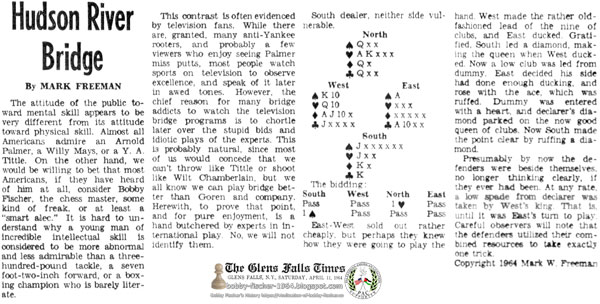The Glens Falls Times Glens Falls, New York Saturday, April 11, 1964 - Page 4
Hudson River Bridge
The attitude of the public toward mental skill appears to be very different from its attitude toward physical skill. Almost all Americans admire an Arnold Palmer, a Willy Mays, or a Y. A. Tittle. On the other hand, we would be willing to bet that most Americans, if they have heard of him at all, consider Bobby Fischer, the chess master, some kind of freak, or at least a “smart alec.” It is hard to understand why a young man of incredible intellectual skill is considered to be more abnormal and less admirable than a three-hundred-pound tackle, a seven foot-two-inch forward, or a boxing champion who is barely literate.
This contrast is often evidenced by television fans. While there are, granted, many anti-Yankee rooters, and probably a few viewers who enjoy seeing Palmer miss putts, most people watch sports on television to observe excellence, and speak of it later in awed tones. However, the chief reason for many bridge addicts to watch the television bridge programs is to chortle later over the stupid bids and idiotic plays of the experts. This is probably natural, since most of us would concede that we can't throw like Tittle or shoot like Wilt Chamberlain, but we all know we can play bridge better than Goren and company. Herewith, to prove that point, and for pure enjoyment, is a hand butchered by experts in international play. No, we will not identify them.
South dealer, neither side vulnerable.
East-West sold out rather cheaply, but perhaps they knew how they were going to play the hand. West made the rather old-fashioned lead of the nine of clubs, and East ducked. Gratified, South led a diamond, making the queen when West ducked. Now a low club was led from dummy. East decided his side had done enough ducking, and rose with the ace, which was ruffed. Dummy was entered with a heart, and declarer's diamond parked on the now good queen of clubs. Now South made the point clear by ruffing a diamond.
Presumably by now the defenders were beside themselves, no longer thinking clearly, if they ever had been. At any rate, a low spade from declarer was taken by West's king. That is, until it was East's turn to play. Careful observers will note that the defenders utilized their combined resources to take exactly one trick.
Copyright 1964 Mark W. Freeman























